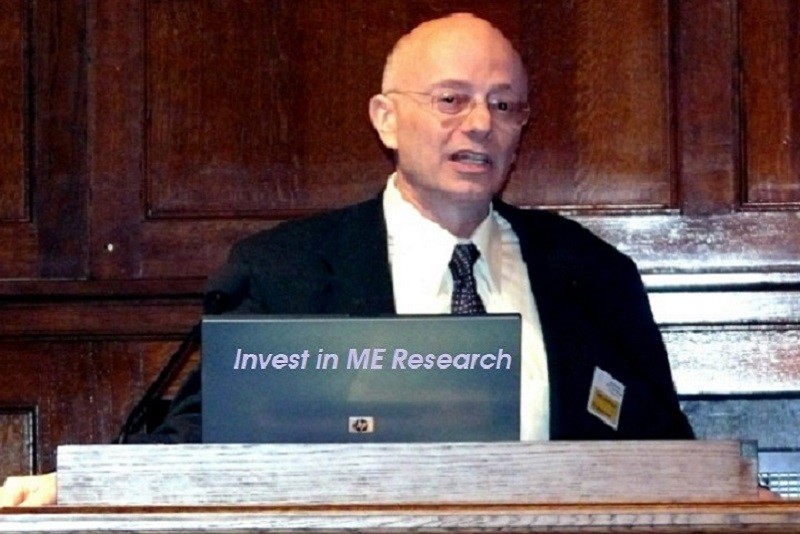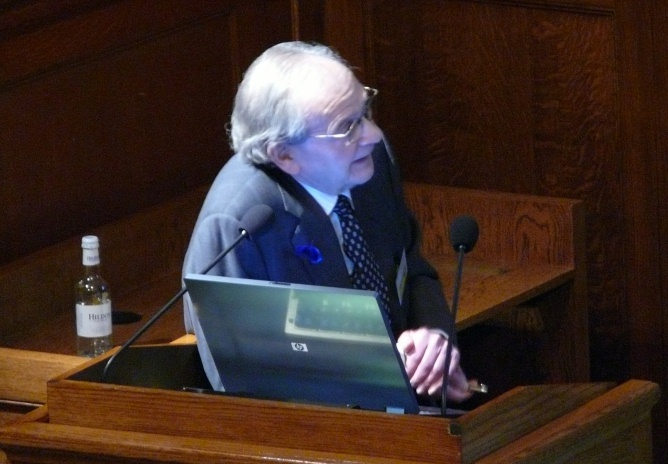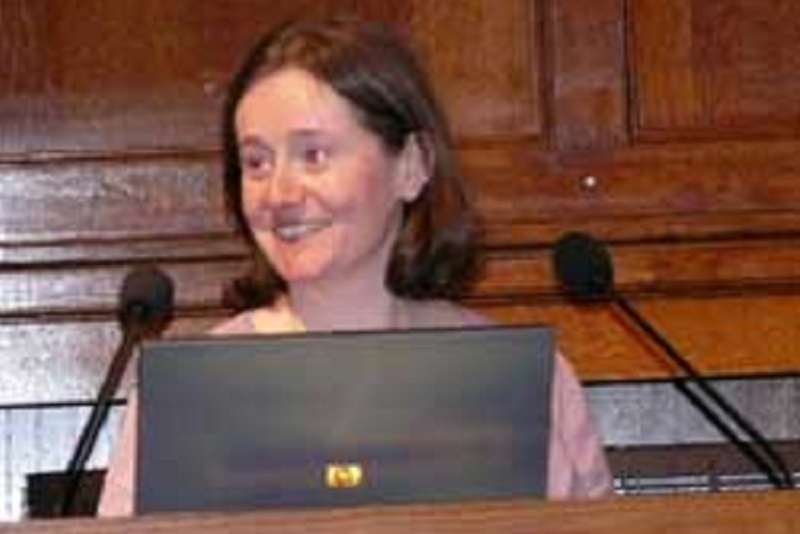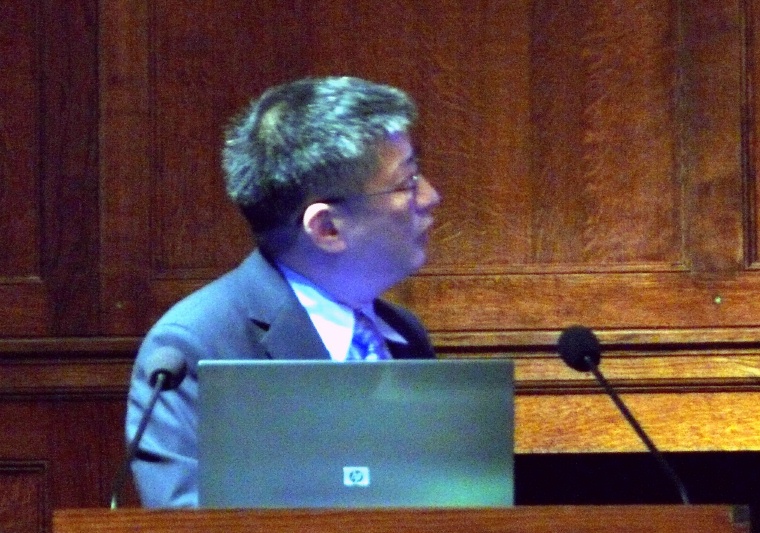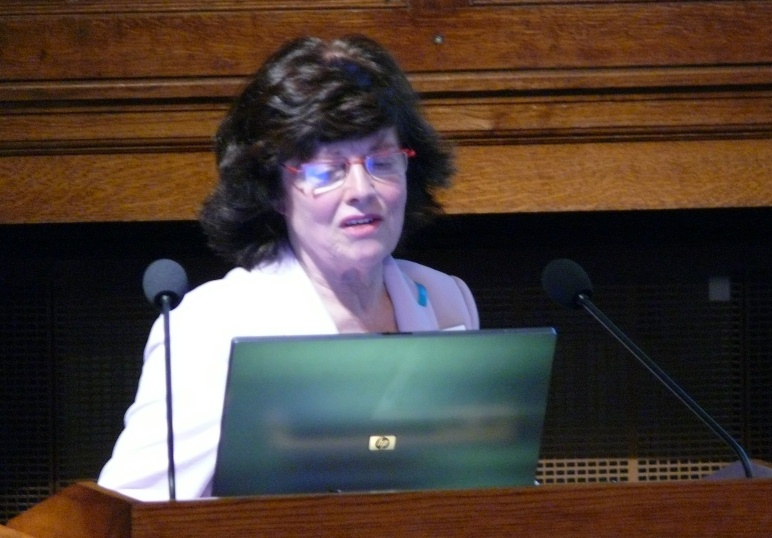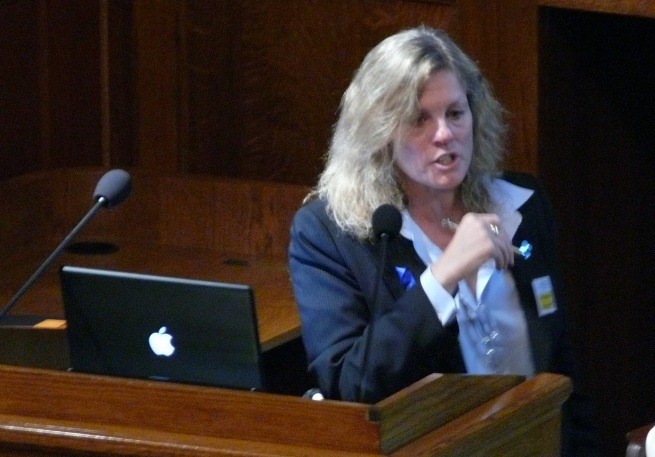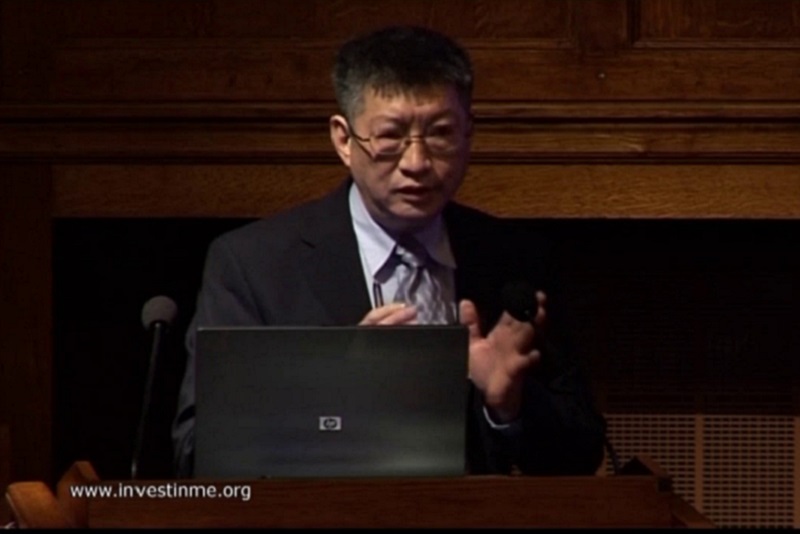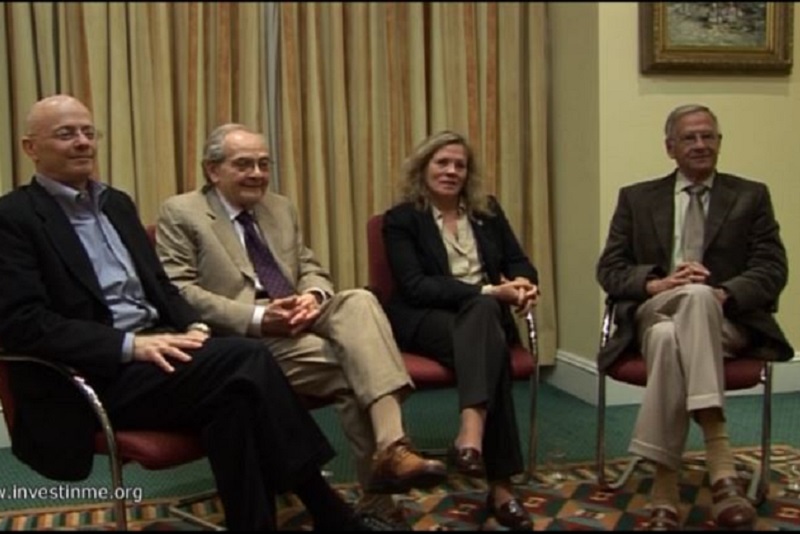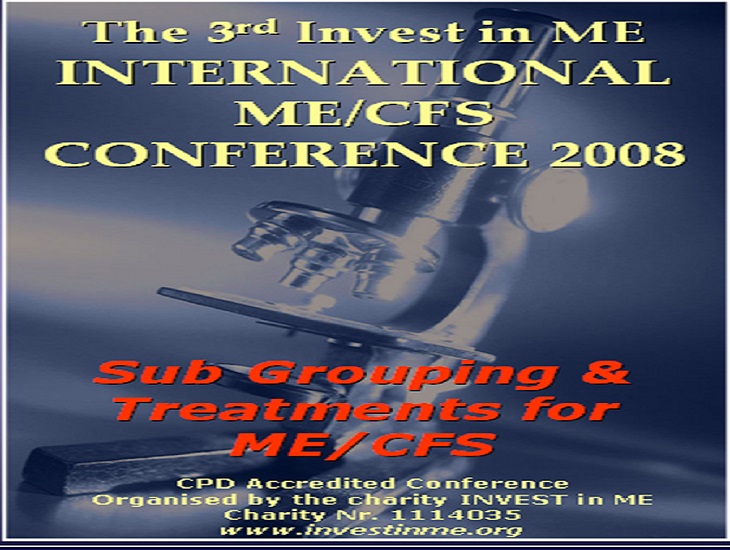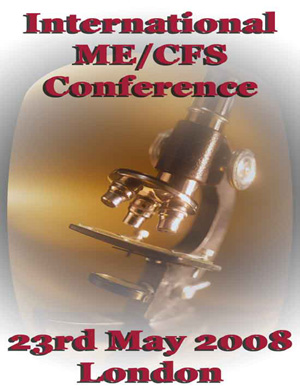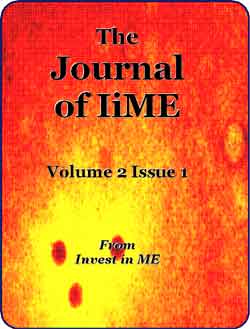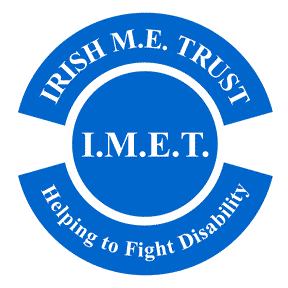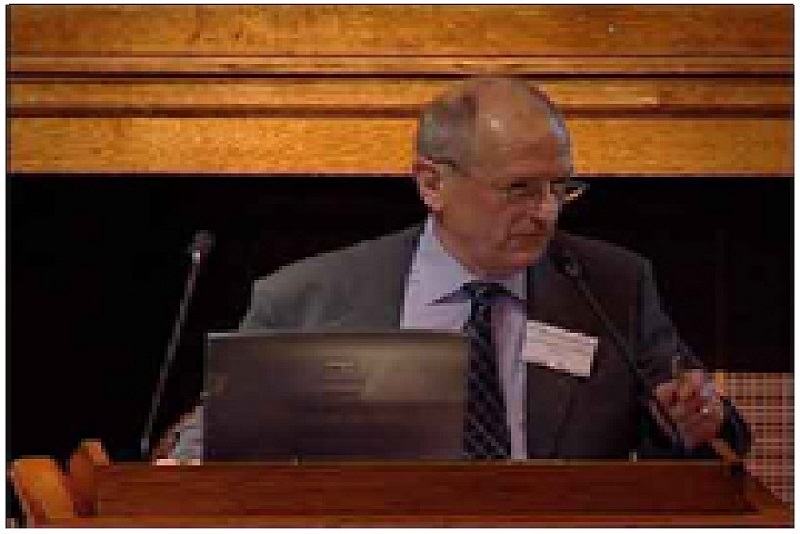

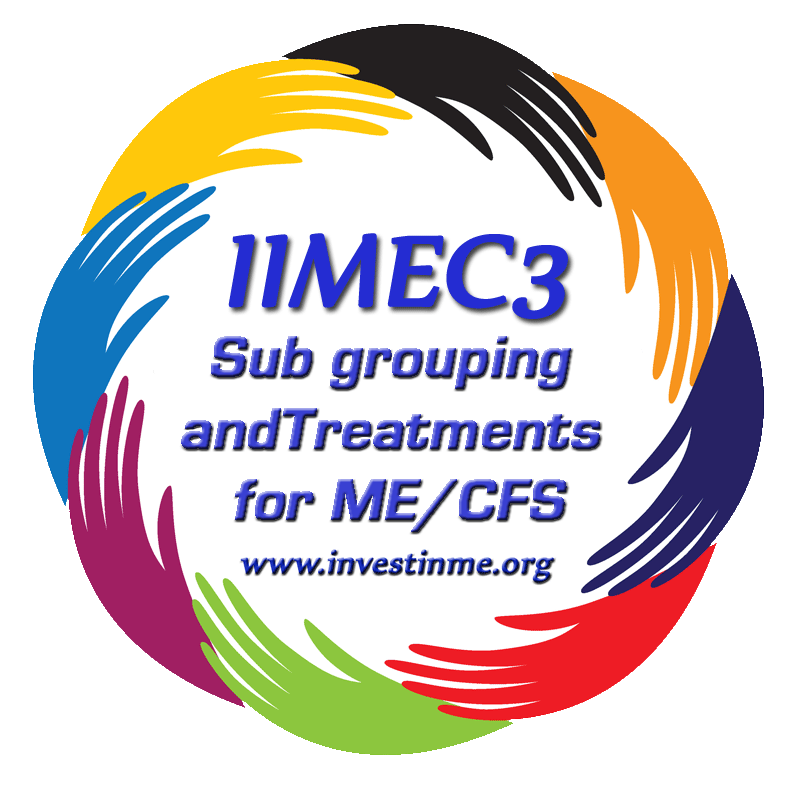
Click on sections below
After the conference the challenge for the Chief Medical officer, the Medical Research Council and the government was to take up the challenge
laid down by the conference and commit to a national strategy of biomedical research into ME,
without any conditions or provisions for enforcing the psychosocial model to be incorporated.
The conference clearly showed that we do not need to perform research in collaboration with the psychiatric lobby in order to gain access to
funding from the MRC.
After looking at the evidence presented by Drs Lerner, Jason, Chia, Newton, Kerr, and experiences of Drs Monro and Spurr,
and after seeing the exciting and dynamic presentation of research from Dr Mikovits showing what can and will be achieved then
the examination of relationships between valid and proven biological markers (as in the conference) and generic,
unproven and sometimes deleterious treatments (as advocated by NICE and the psychiatric lobby) was doomed
to failure and unnecessary delays in providing real treatments and a cure for ME.
As Dr Lerner said at the conference - Treatments (for some sub types) are already there.
Invest in ME passed on an invitation from Mrs Annette Whittemore of the Whittemore-Peterson Institute for Neuro-Immune Diseases in Nevada, USA, to the CMO, the MRC, the Secretary of State for Health and health minister Mrs Ann Keen to visit the institute in the next 6-8 months to look at the plans and strategies being developed for biomedical research into ME. Mrs Whittemore also extended an invitation to for these same people to attend the opening of the WPI in 2010. >> Click here for the text of these letters (CMO example) <<
From our point of view one of the most enjoyable aspects of the conference was the networking which occurred and the possibility of putting people with ME or their carers in direct contact with our presenters, enabling them to get answers or information for their personal set of circumstances. Invest in ME published its third Journal of IiME [click here] prior to the conference. A supplement to the Journal also served as a conference brochure and that is now available [click here].
This conference was dedicated to the work and memory of Dr John Richardson whose dedication to those suffering from ME is still evident today in the work of the John Richardson Research group whose chairman, Dr Irving Spurr, was a founder member of the group and was speaking at the conference.
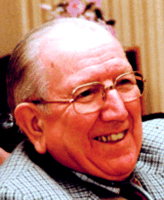
The Third IiME International ME/CFS Conference 2008 Don Baken, Massey University, Palmerston North, NZ
by Don Baken, Massey University, Palmerston North, NZ
I was lucky enough to attend this conference by adding it on to a previously planned work trip to Europe.
I was invited to attend a dinner the night before with most of the speakers.
I was struck by their enthusiasm about the issues associated with ME/CFS and their willingness to talk to others about these.
This summary is an attempt to provide some of the information presented at the conference to people who were not able to be present.
However, I must state that I am not medically trained. This means that my understanding of some of the medical and biochemical aspects may not be accurate.
However, where I have not been sure of my understanding I have either said nothing or relied heavily on the conference abstracts.
Dr Leonard Jason The first speaker was Dr Leonard Jason who is Professor of Clinical and Community Psychology at DePaul University. He argued that it is important to determine which case definition to use in defining the ME/CFS syndrome. He made the point that a case definition should include operationally explicit objective criteria. For example, you are able to differentiate fatigue associated with depression and fatigue associated with ME/CFS by defining more of the nature and severity of the fatigue. This process can be aided through a structured interview schedule. A structured interview schedule is a means of ensuring that each patient is assessed using the same criteria. Dr Jason further illustrated this with his research which identified 5 types of fatigue found in people with ME/CFS (Post exertional, wired, brain, flu-like, and energy). Research has shown that healthy controls only experience the flu-like fatigue. Currently, scientists use the Fukuda et al (1994) CFS case definition. However, Dr Jason argued that this lacked operational definitions and a diagnosis of ME/CFS did not necessitate what appear now to be the three key symptoms of ME/CFS (unrefreshing sleep, post-exertional malaise, and cognitive problems). In other words, you can be diagnosed using the Fukuda criteria with actually having those three key symptoms. Another problem with the Fukuda criteria is that person with clinical depression who does not have ME/CFS could be diagnosed with ME/CFS. The CDC has also developed a case definition. It adds frequency and severity ratings (the Fukuda definition only has yes/no) and changes the time frame from six to one month. Dr Jason thought that the use of standardized measures to measure fatigue and disability were good but pointed out serious problems with the cut off points for the measures chosen by the CDC. The new empirical case definition has the potential include many cases of individuals with pure psychiatric conditions, such as depression, according to Dr. Jason. He compared the Fukuda case definition with the case definition developed by the Canadians with the help of an international panel of experts. Dr Jason clearly believed that the Canadian case definition was superior. The IACFS/ME has developed a paediatric case definition of ME/CFS base on the Canadian case definition. Dr Jason discussed research he had conducted which showed that when compared with the Fukuda definition the paediatric definition had equal specificity and better sensitivity. Dr Jason has been involved in the development of two psychometric measures of ME/CFS, one for adults and one for the paediatric definition. They are available from the IACFS/ME website and are free to use. They have used a factor analysis on data from the adult measure and identified 4 subtypes of people with ME/CFS.
Dr Jonathon Kerr Dr Kerr is the Sir Joseph Hotung Clinical Senior Lecturer in Inflammation at St Georges University of London. He and his team have set out to determine the precise abnormalities of gene expression that occur in blood of CFS/ME patients. Using a sample of about 80 patients with ME/CFS and 125 normal blood donors they have identified 88 genes that expressed differently in people with ME/CFS. 85 of these are overexpressed and 3 are underexpressed. Highly representative functions were in the areas of haematological disease and function, immunological disease and function, cancer, cell death, immune response and infection. Clustering of the QPCR data from the CFS/ME patients revealed 8 subtypes with distinct differences in SF-36 scores, clinical phenotype and severity. Dr Kerr was asked if his research supported the idea that ME/CFS was an inflammatory illness and he said that it did.
Dr Martin Lerner Dr Lerner has a long history in medicine including being Governor for the Michigan American College of Physicians, 1991-1994. He spoke about his Energy Index Point Score (EI) which is a simple and reliable metric (a score of 1-10 with clear anchors of the functional ability for each point) which is used to evaluate the functional capacity of the patient at each visit to the physician. Dr Lerner reported on validation of the EI using two sets of data. One involved a sample of 20 ME/CFS patients and 22 healthy adults matched for sex, age, place and time. The mean score of the healthy adults was 9.9 and of the ME/CFS patients was 3.6. The second involved 55 ME/CFS patients evaluated at the same time using the EI and the Fatigue Severity Scale (a longer standardized measure of fatigue). The patients scores on the two correlated at a level of 0.67 which is in the moderate to high range. EI scores have also been shown to correlate with improvement in ME/CFS symptoms in Dr Lerner’s research. Dr Lerner stated that it is his hypothesis that ME/CFS is the result of viruses which the body has not controlled. Dr Lerner then talked about his experience with antiviral drugs such as valacyclovir and included descriptions of studies of small trials that he has had published. He said that these studies showed that some people could be successfully treated with antivirals. He pointed out that different antivirals worked for different viruses and therefore it was important to know which viruses were a problem for the patient. Dr Lerner talked about how patients with ME/CFS had cardiac abnormalities including abnormal oscillating flat or inverted t-waves at 24 hour ECG monitor and abnormal cardiac wall motion at rest (11.5%) and stress (24.1%). Cardiac biopsies from ME/CFS patients (not recommended by Dr Lerner as these caused dangerous complications for the patients) showed non-inflammatory cardiomyopathy with myofiber disarray, myofiber drop out, apoptosis, and cardiac replacement fibrosis. Dr Lerner also reported on some new data. This was from his ME/CFS patients (187) that he had treated with antivirals in the last six years. Some of these had a single virus (EBV 27.5%, CMV 13.8% and HHV6 1.4%) while others had multiple virus’ of every combination. For those with EBV the mean duration of treatment with antivirals was 3.1 years and for EBV plus others virus’ was 3.5 years. The treatment was continued until the EI score reached eight at which time the antiviral was tapered, stopped or continued as needed to achieve no change in the EI score (i.e. not get worse). The overall sample had a mean start EI score of 4.2 and a mean increase of 1.8 EI points after long term antiviral treatment (there were small differences between the figure he reported at the conference and those in the abstract. It may be that the figures reported at the conference included the addition of more patients because of the time period since the submission of the abstract). This increase is statistically significant (i.e. is not due to chance). Dr Lerner also reported that there were improvements in the heart abnormalities. He reports that his patients have not experienced toxicity with the antivirals. The protocol involves trying the treatment on the patient for one year but if there is no improvement at that stage then he discontinues the treatment (these discontinued patients were included in the results). Dr Lerner mentioned that he is planning to prepare a set of DVDs that will be available to Drs to aid them in their treatment of patients with ME/CFS. It sounds like this will give a thorough description of his protocol. Dr Lerner reported that in his experience patients should not exercise until their EI score is at least seven. He has found that when people with an EI score below seven exercise their health deteriorates.
Dr Julia Newton Dr Newton investigates autonomic function in the pathogenesis of fatigue and includes in this, research into patients with ME/CFS. She stated that doctors have traditionally only been interested in high blood pressure and that if it was not high then it was good blood pressure. Therefore low blood pressure that is experienced by a lot of ME/CFS patients is not considered a problem by many doctors. There is a lot of research that shows a link between autonomic dysfunction and fatigue. Dr Newton reported some of her research. She has found that 27% of people with ME/CFS meet the criteria for POTS which is treatable. Of 100 patients, 28% had a history of loss of consciousness on standing, 48% experienced an increase in ME/CFS symptoms during a tilt table test, and 52% experienced a drop in BP during the tilt table test to suggest orthostatic hypertension. Dr Newton suggested that autonomic problems lead to other problems. One of these is a problem with recovery after exercise. Her research has shown that ME/CFS patients generate more acid in the muscles and take more time to get rid of the acid during recovery. Her research has also shown that patients with ME/CFS, whose BP drops when they stand up, do worse on memory tests. This fits with the cognitive problems that ME/CFS patients report. Dr Newton briefly discussed two possible treatments. One is that there are already established treatments for autonomic dysfunction which she feels is worth trying with ME/CFS. The second is a treatment which they are trying which is called tilt training. This involves the patient slowly learning to adjust better to being upright. She believes that with time the patients system may learn to compensate.
Dr John Chia (some of this is taken directly from his conference abstract) Dr Chia is an infectious disease specialist who both works with patients and conducts research. He stated that enteroviruses (EV) are clear causes of acute respiratory and gastrointestinal infections, with tropism for the central nervous system, muscles and heart. Dr Chia stated that the results of an acute EV infection depended on the immune system and in particular the Th1 part of the immune system. There are certain things which reduce the response of the Th1 system. These include: pregnancy, the last two weeks of the menstrual cycle, steroids, vigorous exercise and prior infections. Dr Chia reported that chronic EV infections have been implicated as the cause of ME/CFS by a few European investigators. However research has not consistently found EV in the blood of patients with ME/CFS. Observations from in vitro experiments and from animal models of EV infection, however, clearly established a state of chronic persistence through the formation of double strand RNA, similar to findings reported in muscle biopsies of ME/CFS patients. Production of non-cytopathic viruses, with partial deletion of the 5’ untranslated region of the viral genome, was recently reported in mice with chronic EV myocarditis. Similar to European studies, Dr Chia’s recent data suggests that EV could be a major trigger/cause among the diverse etiologies for ME/CFS. Dr Chia’s studies have confirmed EV RNA sequence in the peripheral blood leukocytes (PBL) taken from ME/CFS patients, and the relative frequency of RNA detection correlated with the severity of symptoms. Additionally, administration of α-interferon and ribavirin or the combination of α and γ interferon to ME/CFS patients with persistent EV infection resulted in significant improvement of clinical symptoms and suppression of EV RNA. Symptomatic relapses and reappearance of EV RNA in PBL after drug discontinuation lend support to the pathogenic role of EV in patients with ME/CFS. Dr Chia’s research has also found EV capsid protein 1 in 82% of stomach biopsies taken from more than 250 ME/CFS patients. Dr Chia argues that the finding of EV RNA and the growth of non-cytopathic EV in the same tissues provides compelling evidence for persistent EV infection. He stated that renewed interest is needed to further the study of the cause-effect relationship between viral persistence and clinical symptoms of ME/CFS. Controlled trials with future antiviral drugs will likely provide the ultimate evidence for the pathogenic role of EV in ME/CFS. Dr Chia made the point during the presentation that the way that tissue was tested was very important as EV disappeared very quickly from the tissue. Dr Chia stated that thyroid cancer was 6,000 times more likely in people with ME/CFS.
Dr Irving Spurr Dr Spurr is a GP who has extensive experience working with ME/CFS. He is the chairman of the Dr John Richardson Research group. Dr Spurr also talked about the implication of enteroviruses (EV) in ME/CFS. He stated that he has found enteroviruses in water reservoirs and these are not destroyed by chlorination. Dr Spurr stated that treatment was more successful if it started early (therefore the need for an early diagnosis). He also said that the sick cells needed to be rested. He agreed with Dr Lerner that graded exercise should only be used when the patient is feeling much better. He uses immunoglobulin treatment extensively and has not done a RCT because he does not believe it is ethical to not offer it to clients. There are apparently problems with the use of IV IG in the UK and so he uses IM. Treatment also involves stress reduction, toxin free food and drink and choline/vitamin C. Dr Spurr stated that patients with ME/CFS should be treated by a good knowledgeable physician.
Dr Judy Mikovits Dr Mikovits is the research Director at the Whittemore Peterson Nevada CFS centre for the Neuro-Immune disorders. Her presentation was very technical and presented very quickly. This was the last presentation and I am sorry but I had problems keeping up. However, it did become clear that this research institution is well funded and working on cutting edge projects to understand and subtype ME/CFS. Below is a copy of her conference abstract. ME/CFS is a heterogenous (she likened it to cancer) disease with unknown etiology. Previous studies have shown that viral specific immune responses and immune abnormalities play critical roles in the pathogenesis of ME/CFS. The central problem in the management of patients with ME/CFS is the lack of biomarkers for patient stratification into subgroups according to distinct immune responses, virus infections and neurological abnormalities. This situation hinders both the diagnostic process and development of specific treatments. The overall goal of our current research program is to define viral and host parameters that correlate with distinct disease phenotypes. We have taken advantage of the latest technologies, which allow for multiplex analysis from a single sample to better define a cohort with molecular signatures of immune response and correlate those signatures with virus infections using a custom pan viral DNA microarray. We used our clinically well defined cohort for serum cytokine and chemokine profiling using a bead based suspension ELISA for 25 cytokines and chemokines on a Luninex platform in 90 patients and 120 healthy controls; pan custom viral expression microarrays in 40 patients done at two different time points; profiling of innate immune defects including RNase L function and cytotoxic subset profiling as well as correlating microbial induced gastrointestinal inflammation chronic immune activation. Data will also be presented on a subgroup of patients who developed a defect in functional T cell subsets characterized by a clonal rearrangement of T-cell receptor gamma (TCRg). These patients form a distinct subgroup that is characterized by a significantly increased incidence of the developments of Non-Hodgkins Lymphoma.
Poster Dr Tae Park This is the abstract of his poster Objective: Prove the effectiveness of IV IG treatment in ME/CFS patients The study was made by checking the GFR of 125 ME/CFS patients by s-creatinine clearance with cockcroft-auld formula. There are several studies about the effectiveness of IV IG treatment of ME/CFS patients. But there have been no reports as to how they improve. It has been known that ME/CFS is really an inflammatory disease of the CNS, mainly from micro-vasculitis. Also the immunoglobulin is the only drug to improve the CNS inflammation at the present time. Here we report that there is a real measurable evidence to show that there is improved renal blood flow in ME/CFS patients with IV immunoglobulin treatment. We randomly selected 125 patients who met the 1994 Fukuda criteria. We found there were significant renal blood flow improvements in 60 patients (50%) with IVIG treatment. We also found significant improvements of patients symptoms, especially fatigue, sleep disorders, muscle pain and, most of all, they showed marked improvement in the cognitive functions. Among the improved cognitive functions displayed, patients showed remarkable improvements in comprehension and concentrations. The improvement of renal blood flow is between 35% and 60% of previous GFR. These findings of improved renal blood flow may be evidence of improved cerebral blood flow. Furthermore, they may explain the improvement of cognitive functions and other symptoms of ME/CFS patients with IVIG treatment. This study will lead to further investigation of ME/CFS treatment with IVIG treatment.
Conference Presentations from IIMEC3
Professor Malcolm Hooper
Emeritus Professor Sunderland UniversityConference Chair
Coming soon
Professor Malcolm Hooper
Professor Malcolm Hooper is Emeritus Professor of Medicinal Chemistry, University of Sunderland and chaired many of the initial Invest in ME Research International ME Conferences.
Professor Hooper is an internationally-renowned expert on ME/CFS and a tireless campaigner for patients' rights.
Professor Hooper has previously chaired Invest in ME conferences and participates in The Hooper Interviews - interviews with conference speakers at the Invest in ME Conference.
Professor Hooper graduated from University of London and had held appointments at Sunderland Technical College, Sunderland Polytechnic and the University of Sunderland,
where he was made Emeritus Professor of Medicinal Chemistry in 1993.
He has served at many UK universities as well as in India and Tanzania.
He has inaugurated links with Indian research institutions and universities and celebrated 25 years of productive
and on-going links which have,
particularly, involved the design and development of new drugs for tropical diseases and an exploration of natural
products associated with Ayurvedic medicine.
He has published some 50 papers in peer-reviewed journals in the field of medicinal chemistry together with major
reviews on the Chemotherapy of Leprosy,
the Chemistry of Isatogens. Edited one book on the Chemotherapy of Tropical Diseases.
He acted as a referee for a number of important journals and
served on one editorial board. He has served on committees of the Council for National Academic Awards (CNAA), the
World Health Organisation
(WHO) and the Science and Engineering Research Council (SERC).
Professor Hooper is a member of a number of learned bodies, including
the Royal Chemical Society, the British Pharmacological Society and the Society for Drug Research (SDR),
now renamed the Society for
Medicines Research, where he has served on the committee for 12 years and served as Chairman for 2 years.
This involved the planning
and organising of major national and international conferences. He was appointed Chief Scientific Advisor to the
Gulf Veterans Association (GVA)
and accepted by the Ministry of Defence (MoD) as their nominee on the Independent Panel established to consider
the possible interactions between
Vaccines and NAPS tablets.
He has also served on the Gulf Support Group convened at the Royal British Legion. His involvement with the GVA brought
contact with Chronic Fatigue Syndrome/Myalegic Encephalomyelitis (CFS/M.E.) and related disorders. Gulf War Illness/Syndrome
(GWI/S) has much in common
with M.E./CFS.
He is Patron of the Sunderland and South Shields M.E. Association and a member of the Newcastle Research Group,
which includes eminent
physicians and scientists performing research in to CFS/M.E., where one recent aspect has been the identification of
organochlorine pesticide poisoning
being misdiagnosed as M.E./CFS. He has addressed meetings of the Pesticide Exchange Network and consulted to the
Organo-Phosphate Information Network (OPIN).
He worked with the Autism Research Unit (ARU) at the University of Sunderland for over 20 years, leading to involvement
in biochemical studies to offer help, support and treatment for people with autism. This has also lead to research and
urine-analysis of Indolyl-Acroyl-Glycine (IAG), which is an unusual metabolite found in excess of 90% of people
examined in different groups of GWV, M.E./CFS and Organo-Phosphate (OP) poisoning sufferers. He served on the
General Synod of the Church of England from 1970 to 1980 and he is a Christian Lay Leader, Preacher and Teacher.
He is currently involved in three environmental campaigns: Toxic waste dumping, including campaign against sewage in
the sea presenting to the Select Committee on
Sewage Treatment and Disposal GWI/S, presenting to the Defence Select Committee M.E./CFS and OP/Pesticide poisoning
Other Links
Dr Leonard Jason
CASE DEFINITIONS OF ME/CFS – INCLUDING PAEDIATRIC CASE DEFINITIONDePaul University, Chicago
Dr Leonard Jason, DePaul University, Chicago
Dr Leonard Jason has been among the most prolific of all ME/CFS researchers. For more than a decade, Dr Jason and his team at DePaul University’s Centre for Community Research in Chicago have worked to define the scope and impact of ME/CFS worldwide. Dr Jason is Vice President of the International Association for Chronic Fatigue Syndrome (now the IACFS/ME) and has been a key driver of CFS research since 1991, and is uniquely positioned to support collaboration between CFS researchers, patients, and government decision makers. His studies have shown that the direct and indirect costs of ME/CFS amount to $20 billion in the U.S. each year, and more than 1 million people suffer from ME/CFS as opposed to the estimated 20,000 people originally reported by the CDC (Centers for Disease Control and Prevention).
Dr Jonathan Kerr
GENE EXPRESSION IN ME/CFS: A MEANS OF SUBTYPINGSt. George’s University of London
Dr Jonathan Kerr
Jonathan Kerr qualified in medicine from Queen’s University of Belfast (1987), and completed training as a medical microbiologist (1995). He has worked as a microbiologist in Belfast, Manchester and London, taking up post as a Consultant Senior Lecturer in Microbiology at Royal Brompton Hospital / Imperial College in June 2001, and then Sir Joseph Hotung Clinical Senior Lecturer in Inflammation at St George’s University of London in 2005. His interest in Chronic Fatigue Syndrome (CFS) began during a study of the consequences of parvovirus B19 infection, when he showed that a percentage of infected cases developed CFS which persisted for several years. He is now the principal investigator in a programme of research in CFS. This involves development of a diagnostic test using mass spectrometry, analysis of human and viral gene expression in the white blood cells, and clinical trials of immunomodulatory drugs. Dr. Jonathan Kerr and colleagues at St. George’s University of London reported in the July 27, 2005 issue of the Journal of Clinical Pathology that a preliminary study of 25 CFS patients and 25 matched healthy controls revealed abnormalities in 35 of 9,522 genes analyzed using microarray technology. Polymerase chain reaction studies showed the same results for 16 of these genes. The study, and its results, raises some important questions. The first of which pertains to the need for funding of microbiological CFS research. He leads a group of 5 scientists at St George's.
His research on gene expression has resulted in several published papers – including evidence of 7 distinct sub types of ME/CFS.
Dr. Kerr also runs a ME/CFS research program. He studied the consequences of parvovirus B19 infection in ME/CFS and showed that a percentage of infected cases developed ME/CFS which persisted for several years. He has reported 88 human genes whose dysregulation is associated with CFS, and which can be used to derive genomic CFS subtypes which have marked differences in clinical phenotype and severity.
Other Links
Dr Martin Lerner
DIAGNOSIS AND TREATMENT OF ME/CFS LONGITUDINAL OBSERVATIONS OF CARDIAC AND ANTIVIRAL STUDIESInfectious Disease Specialist, Michigan, USA
Dr Martin Lerner, Infectious Disease Specialist, Michigan, USA
Dr. Lerner was a professor of Internal Medicine, and served as chief of the Division of Infectious Diseases for the School of Medicine and Detroit Receiving Hospital from 1963 to 1982. He was chief of the Department of Medicine at Hutzel Hospital from 1970 to 1982.
He established a clinical virology laboratory at the School of Medicine and trained 33 physicians in infectious diseases. He published several groundbreaking papers on Herpes Encephalitics, pneumonia, cardiomyopathy and immunology.
His efforts on behalf of CFS patients led to his development of the Energy Index Patient Score, a functional capacity measurement tool used to diagnose patient fatigue at a time when such a benchmark was lacking. The development of the EIPS resulted in one of his five patents related to the diagnosis and treatment of CFS.
In 2010, Dr. Lerner received the Heart Award from Mothers Against Myalgic Encephalomyelitis, an international advocacy organization representing patients around the world with Myalgic Encephalomyelitis, or CFS, for his more than 25 years of research on the condition and treating CFS patients.
Dr. Lerner received his medical degree from the Washington University School of Medicine and completed his residency in Internal Medicine with Harvard Medical Services at Boston City Hospital and Barnes Hospital in St. Louis, Mo. He served two years with the National Institute of Allergy and Infectious Diseases Epidemiology Unit, and conducted a three-year research fellowship in Infectious Disease at the Thorndike Memorial Laboratory, Boston City Hospital and Harvard Medical School.
He was an elected member of the American Society for Clinical Investigation, American Association of Physicians, as well as a master of the American College of Physicians and governor of the Michigan American College of Physicians.
Dr Julia Newton
AUTONOMIC DYSFUNCTION: IDENTIFICATION OF AETIOLOGICALLY DISTINCT SUBJECT GROUPS WITHIN ME/CFSInstitute of Cellular Medicine, Newcastle University, UK
Dr Julia Newton - Institute of Cellular Medicine, Newcastle University, UK
Dr Julia Newton is Senior Lecturer at the Institute of Cellular Medicine, Newcastle University. Dr Newton has been working on autonomic dysfunction in ME/CFS patients and will be presenting results of her continuing research.
Dr John Chia
RESEARCH ON THE ROLE OF CHRONIC ENTEROVIRUS INFECTION IN CFS/MEInfectious Disease Specialist, Torrance, California, USA
Dr John Chia, Infectious Disease Specialist, Torrance, California, USA
Dr John Chia is an infectious disease specialist practicing in Torrance, California, USA and has published research recently (Chronic fatigue syndrome associated with chronic enterovirus infection of the stomach) on the role of enteroviruses in the aetiolgy of ME/CFS – an area which has been implicated as one of the causes by a number of studies. There are more than 70 different types of enteroviruses that can affect the central nervous system, heart and muscles, all of which is consistent with the symptoms of ME/CFS. By analyzing samples of stomach tissue from 165 patients with CFS, Dr Chia's team discovered that 82% of these individuals had high levels of enteroviruses in their digestive systems. Dr Chia's research may result in the development of antiviral drugs to treat the debilitating symptoms of ME/CFS.
Dr Irving Spurr
A GP’S EXPERIENCES OF DIAGNOSIS AND TREATMENTS OF ME/CFSGP, UK
Dr Irving Spurr - GP, UK
Dr Irving Spurr is a GP and brings enormous experience of ME/CFS to the conference. Dr Spurr worked with Dr John Richardson on enteroviruses and their implication in ME and is chairman of the John Richardson Group.
Dr Jean Monro
CASE STUDIES OF DIAGNOSIS AND TREATMENTS FOR ME/CFSMedical Director of the Breakspear Hospital, UK
Dr Jean Monro - Medical Director of the Breakspear Hospital, UK
Dr Jean Monro is the Medical Director of the Breakspear Hospital and is an internationally recognised specialist in environmental medicine. Dr Monro is a Fellow of the American Academy of Environmental Medicine, a Board Certified US examination. Dr Monro was Medical Advisor to Sanity and Medical Advisor to the Coeliac Association. In early 2007, Dr Monro was asked to be a witness for the House of Lords' Select Committee on Science and Technology on allergy treatments.
Dr Judy Mikovits
HOW SUB GROUPING WILL AFFECT RESEARCH STRATEGIESResearch Director, Whittemore Peterson Institute, Nevada, USA
Dr Judy Mikovits, Research Director, Whittemore Peterson Institute, Nevada, USA
Dr Judy Mikovits obtained her Ph.D. in Biochemistry and Molecular Biology from George Washington University. She is Research Director at the Whittemore Peterson Nevada CFS centre for Neuro-Immune disorders and has co-authored over 40 peer reviewed publications that address fundamental issues of viral pathogenesis, hematopoiesis and cytokine biology.
IIMEC3 Plenary Session
HOW SUB GROUPING WILL AFFECT RESEARCH STRATEGIESResearch Director, Whittemore Peterson Institute, Nevada, USA
IIMEC3 Plenary Session
Plenary session at the end of the IIMEC3 Conference.
Interview with Dr John Chia
Interview with Professor Malcolm HooperOrganised by Invest in ME
Dr John Chia, Infectious Disease Specialist, Torrance, California, USA
Dr John Chia is an infectious disease specialist practicing in Torrance, California, USA and has published research recently (Chronic fatigue syndrome associated with chronic enterovirus infection of the stomach) on the role of enteroviruses in the aetiolgy of ME/CFS – an area which has been implicated as one of the causes by a number of studies. There are more than 70 different types of enteroviruses that can affect the central nervous system, heart and muscles, all of which is consistent with the symptoms of ME/CFS. By analyzing samples of stomach tissue from 165 patients with CFS, Dr Chia's team discovered that 82% of these individuals had high levels of enteroviruses in their digestive systems. Dr Chia's research may result in the development of antiviral drugs to treat the debilitating symptoms of ME/CFS.
Interview with IIMEC3 Presenters
Interview with Professor Malcolm HooperOrganised by Invest in ME



